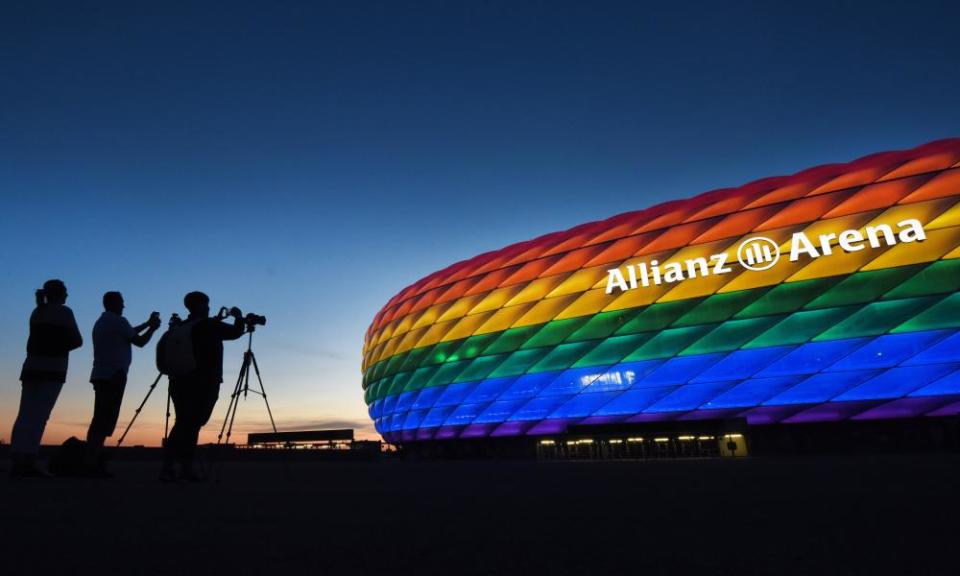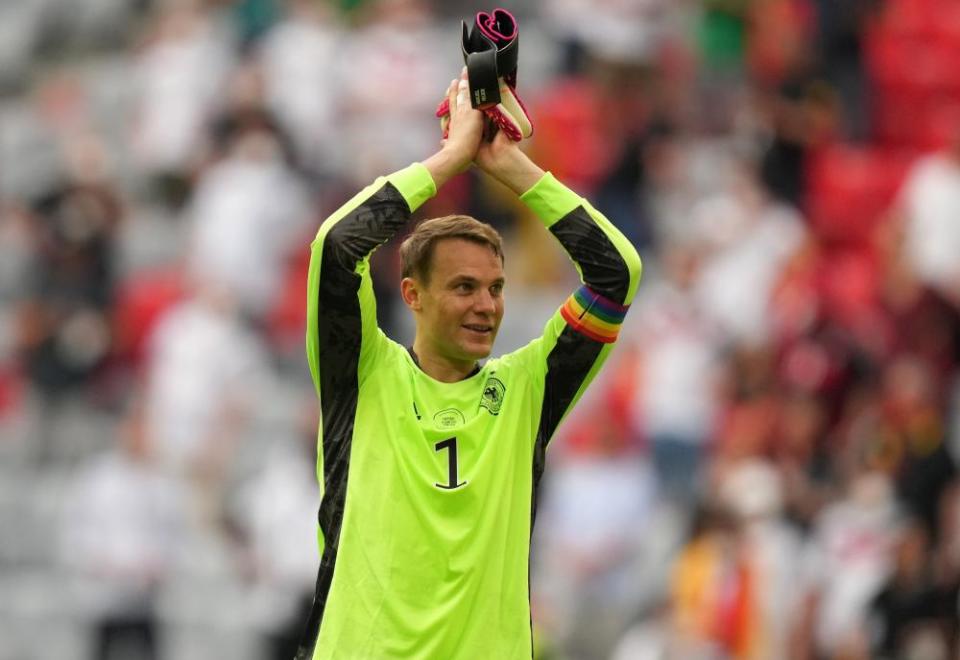‘Shameful’: Uefa blocks LGBTQ+ rainbow stadium protest in Munich

Munich’s mayor has attacked the “shameful” decision by Uefa to quash his city’s plans to illuminate its Allianz Arena in rainbow colours in support of LGBTQ+ rights for Germany’s Euro 2020 match against Hungary on Wednesday.
European football’s governing body said the rainbow lights would contravene its rules about political and religious neutrality.
Munich city council and LGBTQ+ activists had requested the move in protest at legislation passed by Hungary’s parliament banning gay people from featuring in school educational materials or TV shows for under-18s.
Related: How to support our sports coverage (without asking a billionaire) | Jonathan Liew
The mayor of Munich, Dieter Reiter, was reported on Tuesday afternoon to be planning instead to illuminate a wind turbine opposite the stadium in rainbow colours. Football stadiums elsewhere in Germany, including in Cologne and Frankfurt, pledged to “fill the void” and light up instead.
Munich’s city council said it had wanted to illuminate the stadium in order to “send a signal of support for inclusivity and diversity”. But Uefa said in a statement it had no choice than to reject the action on the grounds that it “contravened its regulations as a political and neutral organisation”. It said due to the “political context” of the application, “a message aiming at a decision taken by the Hungarian national parliament”, Uefa had to decline the request.
To the fury of some activist groups, it recommended instead that Munich authorities illuminate the stadium on Christopher Street Day on 28 June, or during Pride Week in Munich between 3 and 9 July. Reiter rejected the suggestion as a “ridiculous counterproposal”.
In a statement he said: “I find it shameful that Uefa forbids us from setting an example for diversity, tolerance, respect and solidarity.” He also criticised the German football federation, DFB, calling it “disappointing” that it had failed to stand up to Uefa and support Munich’s request. “The DFB, despite the overwhelming approval from all over the country, has not been willing to position itself to influence the result,” Reiter said.
Download the Guardian app from the iOS App Store on iPhones or the Google Play store on Android phones by searching for 'The Guardian'.
If you already have the Guardian app, make sure you’re on the most recent version.
In the Guardian app, tap the yellow button at the bottom right, then go to Settings (the gear icon), then Notifications.
Turn on sport notifications.
The Bundesliga club Eintracht Frankfurt said it was planning to show solidarity with the campaign by illuminating its ground, Deutsche Bank Park. In a statement on Twitter, its executive board spokesman, Axel Hellmann, said: “If Munich is not allowed to do so on Wednesday, then other stadiums in the country will have to show their colours. Deutsche Bank Park will be lit up in rainbow colours at the time of the Hungary match.”
FC Cologne said it would also join in. “We very much welcome this. Cologne and the FC stand for diversity and tolerance,” its chief executive, Alexander Wehrle, told the broadcaster WDR, calling the developments in Hungary “horrifying”.
A signal for diversity 🏳️🌈
During the @DFB_Team_EN game against Hungary on Wednesday evening, the RheinEnergieSTADION pylons will light up in rainbow colours. pic.twitter.com/RMJ0F8kcw6— 1. FC Cologne (@fckoeln_en) June 22, 2021
The controversy relates to a law passed in Hungary a week ago that bans gay people from featuring in school educational materials or TV shows for under-18s, which is being seen as the latest attempt by the government of Viktor Orbán to clamp down on LGBTQ+ rights.
Related: Hungary’s classrooms have become the new battleground for the war on ‘LGBT ideology’ | Mark Gevisser
Hungary’s largest LGBTQ+ organisation, Háttér Society, said it was disappointed that the plan to light up the Allianz Arena would not now go ahead, saying it would have been a “massive show of support” for its cause.
“Prime minister Viktor Orbán and his ruling Fidesz party have pumped huge amounts of money into attempting to revive football again as a source of national pride, so that had the team had to walk into a stadium illuminated in rainbow colours it would have been very ironic,” a Háttér Society spokesperson told German media.
On Monday, the Hungarian foreign minister, Péter Szijjártó, defended the new law, and said it was wrong and dangerous to mix sport and politics. “We have passed this law in order to protect Hungarian children and western Europe is now fighting against this,” he said. “I believe it is harmful and dangerous to confuse politics with sport. Historical experience shows that if anyone knows this for sure, it’s the Germans.”
Meanwhile, Germany’s team captain, Manuel Neuer, is to be allowed to continue wearing a rainbow-coloured armband after a Uefa investigation ruled it did not contravene its policy on political neutrality.

Neuer was attacked for wearing the band by Uwe Junge, a politician from the far-right Alternative für Deutschland party, who described it as a “faggot’s armband”. Uefa ruled the armband was a “symbol of diversity and thus for a good cause” and would therefore not be forbidden.

 Yahoo Sport
Yahoo Sport 





































